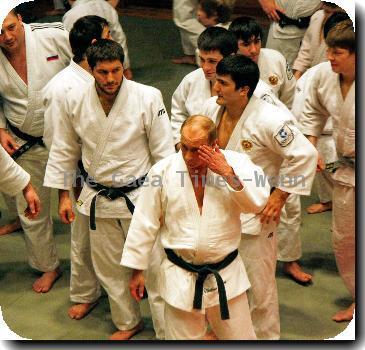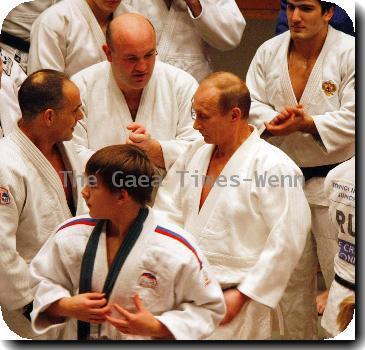Oligarch Boris Berezovsky wins libel case against Russian broadcaster in London
By Raphael G. Satter, APWednesday, March 10, 2010
Oligarch wins suit against Russian broadcaster
LONDON — Self-exiled Russian tycoon Boris Berezovsky has won his libel case against a Kremlin-owned broadcaster that aired allegations he masterminded the murder of a former KGB agent in London.
The 64-year-old tycoon’s victory against All-Russian State Television and Radio Broadcasting is the latest round in the oligarch’s battle against the Kremlin, which has long sought to bring him before a Russian court.
Berezovsky sued after the broadcaster, known by its acronym RTR, aired a show in which it was suggested he was behind the poisoning death of renegade Russian agent Alexander Litvinenko, who died in 2006.
In the ruling at London’s High Court, Justice David Eady awarded Berezovsky 150,000 pounds (about $225,000) in damages, saying: “There is no evidence before me that Mr. Berezovsky had any part in the murder of Mr. Litvinenko. Nor, for that matter, do I see any basis for reasonable grounds to suspect him of it.”
Berezovsky, who was in court for the verdict, said in a statement he was pleased the court “has unequivocally demolished RTR’s claims.”
RTR, which did not take part in the hearings, called the judgment illegal. Speaking from Moscow, the broadcaster’s lawyer Zoya Matviyevskaya said the company “does not recognize the decision of the court” and was ready to take the case to the European Court of Human Rights in Strasbourg.
Berezovsky, a once-powerful member of former Russian President Boris Yeltsin’s circle, played a key role in the rise of his successor, Vladimir Putin. But the oligarch’s influence crumbled as Putin tightened his grip on power, and Berezovsky fled to Britain in 2001, allying himself with prominent Kremlin critics.
Among them was Litvinenko, who fled Russia with Berezovsky’s help after accusing officials there of plotting to assassinate political opponents.
Litvinenko died on Nov. 26, 2006 after drinking tea laced with a lethal dose of the rare radioactive isotope polonium-210 in a London hotel. From his deathbed, Litvinenko accused the Kremlin of orchestrating his poisoning, and British police named former KGB agent Andrei Lugovoi as the prime suspect.
Both Lugovoi and the Kremlin denied the accusations, with the former instead claiming Berezovsky — whom Russia has consistently sought to extradite on a wide variety of criminal charges — engineered his friend’s death as a way of embarrassing the Kremlin and buttressing his refugee status.
Similar claims were made by RTR’s “Vesti Nedeli,” a weekly news review show, in April 2007.
The show carried testimony from a silhouetted figure identified as “Pyotr,” who claimed that Berezovsky had offered him a huge sum to pretend to be a hit man charged with the multimillionaire’s murder. The idea, Pyotr said, was to make Berezovsky’s request for asylum more convincing.
The show’s presenter then suggested that Berezovsky killed Litvinenko because the former agent knew too much about the fraudulent asylum claim.
Berezovsky said the allegations were outrageous and deeply offensive because he was a close friend of Litvinenko, whose widow Marina testified on the tycoon’s behalf.
Berezovsky said that the “Pyotr” in the program was in fact Vladimir Terluk, a Kazakh asylum seeker. Terluk denied this in court, but in his judgment Eady said “there was no doubt” the two were one and the same.
RTR, for its part, boycotted the proceedings on the grounds that it had been prevented from defending itself because it refused to bow to demands that it reveal the source of its reporting.
The broadcaster also complained that Eady had tried the case without a jury — an unusual although not unheard of procedure.
Eady, who found against both Terluk and RTR, noted that in his judgment that Berezovsky was seen by some as “a criminal on the run from Russian justice” and others “as a political dissident who is working for justice and democratization.”
“It is not for me to take sides in that wider debate,” he said. “Obviously, many people have fixed views about Mr. Berezovsky and most will not change them as a result of this judgment.
“He is nevertheless entitled to his remedy as reflecting the court’s clear and unequivocal finding, on the evidence, that the relevant allegations are false.”
Associated Press Writer David Nowak in Moscow contributed to this report.
Tags: Diseases And Conditions, Eastern Europe, England, Europe, London, Moscow, Poisoning, Russia, United Kingdom, Violent Crime, Vladimir Putin, Western Europe

